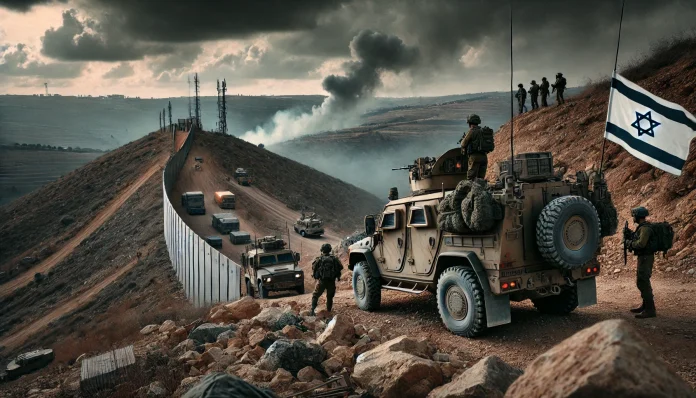The conflict between Israel and Hezbollah, the Lebanon-based Shiite militant group, has reached new levels of intensity in recent weeks, raising alarms among regional and international observers. The roots of this conflict trace back decades, with deep-seated animosities inflamed by ideological, religious, and territorial disputes.
However, this current escalation has brought renewed fears of a broader regional conflict, as both sides engage in an increasingly aggressive exchange of hostilities along the Israel-Lebanon border.
Historical Context and Background
The Israel-Hezbollah conflict is long-standing, rooted in the geopolitical complexities of the Middle East. Hezbollah, founded in the 1980s, originally formed as a resistance movement against Israeli occupation in southern Lebanon.
Supported by Iran and Syria, the organization has grown in strength and influence, functioning both as a political party in Lebanon and as a paramilitary force. Israel, which considers Hezbollah a terrorist organization, sees the group as a major threat to its national security, particularly given its close ties to Iran, Israel’s most prominent adversary in the region.
Over the years, skirmishes between Israel and Hezbollah have periodically flared up, with the most significant confrontation occurring in 2006. This 34-day conflict caused significant destruction, primarily in Lebanon, and resulted in over a thousand deaths, mostly Lebanese civilians. Though a United Nations-brokered ceasefire ended active hostilities, the situation along the border has remained volatile.
The Current Escalation

The recent escalation appears to have been triggered by a combination of local and international factors, including heightened tensions between Israel and Iran. Hezbollah, which has been stockpiling arms and strengthening its military capabilities, has intensified its rhetoric against Israel, issuing statements that it stands ready to act if it perceives an Israeli threat to Lebanon’s sovereignty.
Israel, in turn, has increased its military presence along its northern border, conducting regular patrols and airstrikes aimed at preventing Hezbollah from gaining further ground.
Since early October, exchanges of fire across the Israel-Lebanon border have become more frequent, with both sides suffering casualties. Israel has carried out several airstrikes on Hezbollah positions in Lebanon, while Hezbollah has responded by launching rocket attacks targeting northern Israeli towns.
Civilian casualties on both sides have fueled anger and fear among the local populations, with thousands of Lebanese and Israeli families living in proximity to the border fleeing to safer areas.
International Responses and Diplomatic Efforts
The international community has reacted with concern, urging restraint to prevent a further escalation that could destabilize the already fragile region. The United States has taken an active role, with President Joe Biden attempting to mediate a ceasefire.
According to statements from the White House, Biden has been in contact with both Israeli and Lebanese leaders, urging both sides to de-escalate and avoid any actions that could lead to a full-scale war.
Other global leaders, including those from the European Union and the United Nations, have echoed these calls for calm, expressing particular concern over the potential for a humanitarian crisis in Lebanon, where infrastructure is already weakened by economic instability and political turmoil.
French President Emmanuel Macron, who has been closely involved in efforts to support Lebanon’s recovery from its ongoing economic crisis, has also offered to mediate talks between the conflicting parties.
Regional Implications and Future Outlook
The Israel-Lebanon conflict has broader implications for the Middle East. Analysts warn that a sustained conflict could draw in Iran and potentially Syria, each of whom has vested interests in the region. Iran, which is believed to supply Hezbollah with weapons and funding, has stated its support for Hezbollah’s “right to defend Lebanese sovereignty,” although it has refrained from direct involvement.
Meanwhile, other neighboring countries, such as Jordan and Egypt, are wary of the potential for refugee flows and economic instability that a protracted conflict could bring.
Israel’s position is complex; while it seeks to neutralize Hezbollah as a threat, it must also weigh the consequences of a full-scale war, which would likely result in significant international condemnation and further destabilize its borders.
Meanwhile, Hezbollah’s actions, while emboldened by Iranian support, are constrained by Lebanon’s fragile political and economic state, which has suffered significantly in recent years due to corruption, mismanagement, and external pressures.
What’s Next for the Middle East?
As of now, the Israel-Lebanon conflict remains a powder keg with the potential to ignite into a much larger confrontation. Diplomatic efforts continue, but the path to peace remains unclear, with both Israel and Hezbollah firmly committed to their opposing positions. The coming weeks will likely be critical, as the international community watches closely, hoping for a peaceful resolution but bracing for the worst.
If the conflict continues to escalate, it risks destabilizing not only Lebanon and Israel but also the broader Middle East, with consequences that could reverberate far beyond the region.



